
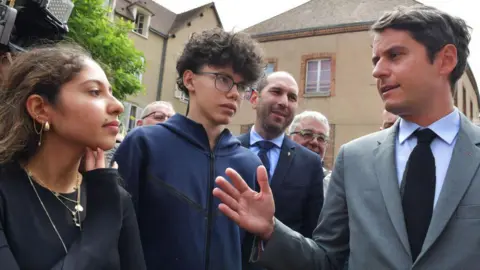 FRANCOIS MONIER/AFP
FRANCOIS MONIER/AFP
PM Gabriel Attal is not expected to survive in his job much beyond Sunday's elections
French Prime Minister Gabriel Attal has appealed to voters to block the National Rally (RN) party of Marine Le Pen and Jordan Bardella from winning Sunday's general election.
The party led the first round last Sunday with more than 33% of the vote and has already won dozens of seats outright. If it secures more than half the 577 seats in the National Assembly, it will be be able to form a government.
"There's one bloc in a position to win an absolute majority, and that's the far right," Mr Attal told French radio.
Many French voters would not enjoy using their vote to block RN, he said, but "I consider it's our responsibility to do it".
The second round of a French parliamentary is generally made up largely of run-off duels between the top two candidates in a constituency, but because so many third-placed candidates qualified on Sunday, that set up more than 300 three-way run-offs.
Some 218 candidates for either the left-wing alliance or Mr Attal's centrist bloc withdrew their names before Tuesday evening's deadline to give a political rivals a greater chance of defeating the RN.
Marine Le Pen condemned what she called the political class for "giving an increasingly grotesque image of itself".
Party leader Jordan Bardella, who is favourite to become prime minister under an RN government, denounced an "alliance of dishonour". He told Le Figaro newspaper he found it regrettable to see a president who had accused the radical left France Unbowed of antisemitism now "throwing himself into the arms of [its leader] Jean-Luc Mélenchon".
Mr Bardella was confident his party still had a chance of winning an outright majority on Sunday, because they had an ambition and a project for France. He already has the support of part of the conservative Republicans party, and he has appealed to the rest to join him and reject the "Macron-Mélenchon coalition".

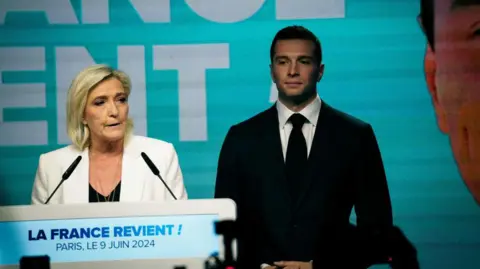 DANIEL DORKO/Hans Lucas/AFP
DANIEL DORKO/Hans Lucas/AFP
Jordan Bardella (R) is favourite to become prime minister if RN wins an absolute majority
If the RN is unable to form a government, there is speculation that some kind of coalition could be formed without either the RN or radical left. But the prime minister said he would not impose any coalition on France that they did not choose.
President Macron has vowed to continue in office whatever the result, until his term ends in 2027. He had no need to call the parliamentary vote, but after his party's poor performance in European elections last month, he said a vote was the only way of enabling France to "move on and reunite".
Not everyone in the centrist camp is happy they have ended up making deals with a left-wing alliance that includes Jean-Luc Mélenchon, and there is no evidence that French voters will do as the party leaders suggest and vote for a party they would otherwise avoid.
Mr Mélenchon has been accused of defending anti-police sentiment and has come under fire for refusing to call Hamas a terrorist organisation.
Mr Attal made clear that withdrawing candidates in favour of the New Popular Front did not mean they were joining forces with Mr Mélenchon. "There isn't and there never will be any alliance with France Unbowed," he promised.
However, the broad agreement to withdraw candidates has left some bizarre choices for French voters.
Interior Minister Gérald Darmanin now goes into a run-off against his RN rival, after Leslie Mortreux of France Unbowed pulled out, and the same goes for former Prime Minister Élisabeth Borne.
Among the third-placed Macron candidates to drop out were two ministers, Sabrina Agresti-Roubache and Marie Guévenoux.
Édouard Philippe, who was prime minister for three years at the start of the Macron presidency in 2017, said he would vote for a Communist candidate in the second round.
But he made clear he would not support Jean-Luc Mélenchon's party, after witnessing how it had contributed to political chaos.
"I'd rather have an MP I know and who I can work with... even if we have differences, who I think shares my democratic requirements, rather than the National Rally," he told TF1 TV.
François Hollande, the former Socialist president who was originally Emmanuel Macron's boss at the Élysée Palace, said the concerted withdrawals had "minimised" the chances of the far right winning an absolute majority, although it could not be "ruled out".
Mr Attal chaired a cabinet meeting on Wednesday which may be his last as prime minister.
National Rally boss Marine Le Pen accused him of using the occasion to make a series of new appointments, including police chiefs.
Government spokeswoman Prisca Thevenot hit back, saying that she should read the constitution.
"I think we knew that Madame Le Pen lied, now we know she manipulates information," she said. Such appointments were nothing new, she said, especially when it came to preparing for the start of the next school year.
Meanwhile, the head of France's confederation of small and medium enterprises, François Asselin, complained that President Macron's decision to dissolve parliament had cost France "a quarter of growth" and nobody appeared to have taken the economy into account.
If either the left-wing New Popular Front alliance or National Rally were able to put their economic plans into practice, "the punishments from the markets will be immediate", he told BFMTV.

 5 months ago
54
5 months ago
54




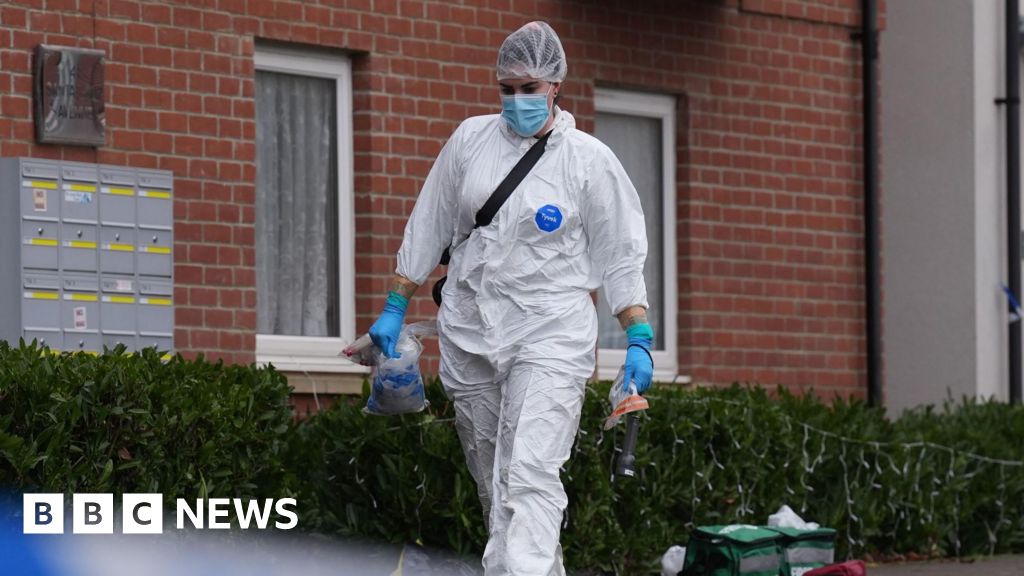

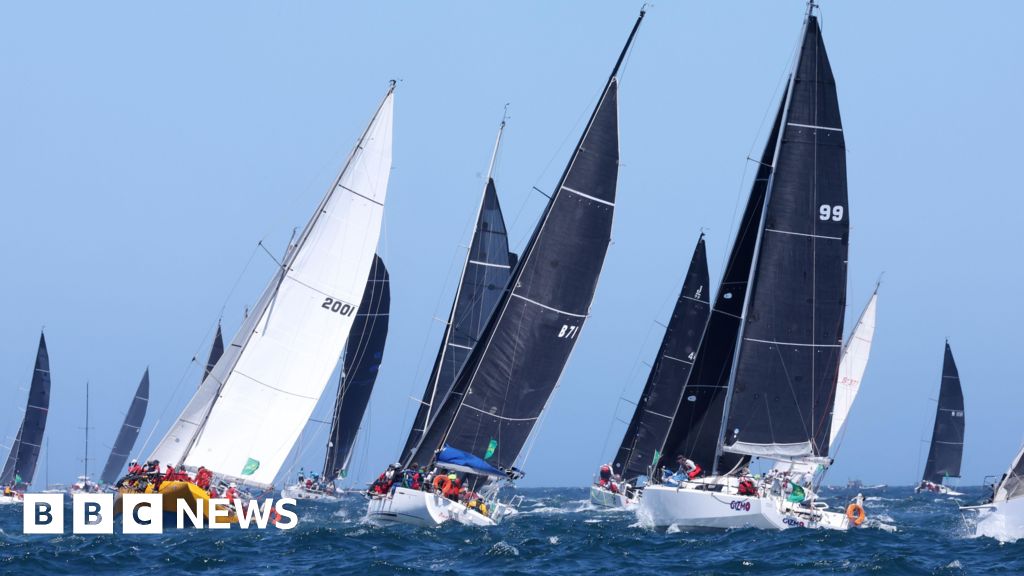


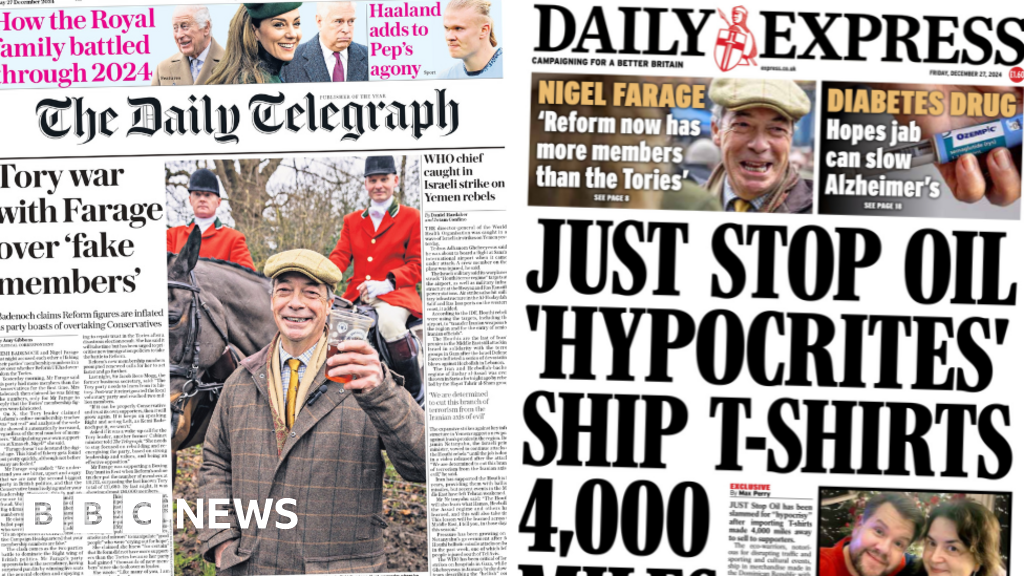





 English (US) ·
English (US) ·